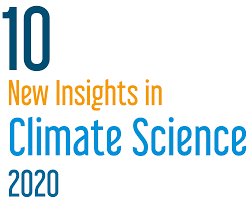
A Year of Insights Review
Each year we consult researchers and carry out a horizon scan in fields related to climate change on what the latest findings and most important new emerging fields are. We summarize this in 10 important scientific insights, and the result has always been a rich and valuable scientific synthesis for policy and society at large, a testament to the ever-expanding and improving knowledge of our planetary climate systems and the interactions with the human world. - Hide
This year has been no exception in terms of science advances, but an unusual one as the world was shaken by the COVID-19 pandemic. Researchers have scrambled to analyze and make sense of the rapid changes brought on by restrictions imposed by governments to control the pandemic. Several new methods for analyzing emissions of climate-affecting pollutants were developed at astonishing speed in order to track emissions at a higher temporal resolution than had previously been possible. As a result, it is estimated that global emissions of carbon dioxide fell by 8.8% for the first half of the year and 17% at the day of maximum lockdown of our economies. The scale of these decreases is unprecedented. Interestingly, the scale of global emission reductions caused by the pandemic is on a par with the scientifically defined annual reduction requirements over the next 30 years (between 6–8% reduction in emissions per annum).
This aligns with keeping within the global carbon budget for a chance of holding global warming at 1.5°C. And yet, the changes in emissions in 2020 have very little influence on humanity’s total impact on climate systems, as greenhouse gases from human activities have been accumulating for centuries and continue to do so.
The past year has in many ways been unfortunate and tragic, but it’s important that we use the experiences from the pandemic to deepen our understanding of how we can mitigate and prepare for global systemic threats. The pandemic has been a “stress test” that has spotlighted inadequacies of both governments and international institutions to cope with transboundary risks. The impacts of climate change have the potential to be as abrupt and far-reaching as the current pandemic. Recent research presented in this report shows that negative impacts can be expected on fundamental requirements for human well-being, such as access to clean water and conditions for good mental health.
Moving forward, the latest research calls for innovative, imaginative, and transformative approaches to building sustainable and resilient human societies. For instance, by strengthening global cooperative frameworks and building new governance arrangements that can include bottom-up community initiatives. In the short term, we have a one-off opportunity to get on the right path by directing post-pandemic recovery spending to green investments.
If the focus is instead on economic growth, with sustainability as an afterthought, it would jeopardize our ability to deliver on the Paris Agreement. Alarmingly, governments do not yet seem to be seizing the opportunity to shift towards low-carbon, healthier, and more resilient societies.
While this report confirms the continued amplification of key environmental impacts, such as higher than expected emissions from permafrost thaw and possible weakening of the land sink, it also points to opportunities that arise from new insights in climate change economics and governance, and the possibility of using climate litigation. There is still a window of opportunity but 2021 will be a critical year to act if the world is to achieve the Paris Agreement targets.
This report is a summary of the article Pihl et al., (2021). 10 New Insights in Climate Science 2020 – a Horizon Scan, Global Sustainability, 4. https://doi.org/10.1017/sus.2021.2. All statements in this summary report are based on this article, except when referring to a specific source.










Add new comment